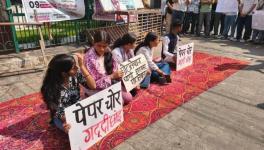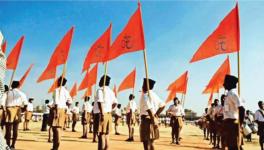Punjab: Can Cabinet Reshuffle Save Congress in Upcoming Elections?
Following Punjab Chief Minister Captain Amarinder Singh's meeting with Congress President Sonia Gandhi at her residence in Delhi, speculation of a possible Cabinet reshuffle to accommodate all sections, including a disgruntled Navjot Singh Sidhu, have re-emerged. The meeting with senior Gandhi was an attempt to resolve the crisis that has gripped the Congress unit in Punjab ahead of crucial Assembly elections. However, the question remains: How much will a change in the Cabinet benefit the Congress party?
Experts are divided on whether a Cabinet rejig would favour the Congress or not. Few believe that the reshuffle would only be significant if the disgruntled leader Sidhu is given a prominent role in the party or the government. Others believe that the reorganisation will have a little impact on how the Congress is seen on the ground. The Congress came to power in the state in 2017 after winning 77 of the 117 assembly seats, followed by the AAP with 20, Akalis with 15 and the Bharatiya Janata Party (BJP) with three seats.
Meanwhile, the Punjab CM’s announcement after the meeting that whatever Sonia Gandhi decides “would be acceptable to him” is indicative of a possible truce between the CM and Sidhu. However, the Congress MLAs Newsclick spoke to fear that the damage has already been done.
Until a few months ago, CM Amarinder Singh’s victory seemed inevitable but something changed in the last few months. A simmering discontent inside the party and among the voters is now out in the open as exemplified by Sidhu.
At the time of writing this article, farmers were protesting over high prices of fuel and diesel in Punjab. Newsclick has previously reported on how, in addition to farmers, protests in Punjab have picked up steam, expressing public dissatisfaction.
CM Singh’s inability to keep up with his poll promises has aided Sidhu, according to Veteran journalist Jagtar Singh. “Congress with such a large mandate has betrayed the people of Punjab. Navjot Singh Sidhu, who is a loner, has gained from it. So, he has come forward,” he said.
Congress is plagued with a slew of unfulfilled promises, anti-incumbency and dissension. The opposition has not missed any opportunity to capitalise on these failures.
The 2015 Guru Granth Sahib desecration, also referred to as Guru Granth Sahib sacrilege, coupled with the Kotkapura police firing incident remains one of the most pressing issues in Punjab. The sacrilege issues refers to series of desecration incidents of the Guru Granth Sahib and subsequent protests that followed. The protests witnessed heavy-handedness by the police at Kotkapura chowk on October 14 injuring six Sikh protestors.
The incident had cast its shadow on the Akali Dal, which lost its credibility among the Sikh voters and has been grappling with its aftermath since then. The Punjab and Haryana High Court dismissed an SIT investigation into the case led by former Inspector General of Police (IGP) Kunwar Vijay Pratap Singh on April 9, further infuriating the Sikh voters. Despite the fact that a new SIT has been established, the delay in delivering justice in the 2015 sacrilege case and following police shooting episodes, which was one of Congress's election promises, remains a stumbling block.
Meanwhile, with the joining of former IG of Punjab Police, Kunwar Vijay Pratap Singh, the Aam Aadmi Party (AAP), which was nearly decimated, has again marked the party’s presence in the state. Pratap Singh who was part of a Special Investigation Team (SIT) investigating the police firing incident had quit his services after his probe was quashed by the High Court, which has worked in the building of his image as someone who fights for justice.
Political observers believe that if the Congress manages to bring the sacrilege and police firing issue to its logical conclusion in the next three months, it would be able to contain some damage.
The discord within the Congress has opened a new window for the AAP and the Akali-BSP alliance to play their game, which is largely based on the unfulfilled poll promises of the ruling party. Meanwhile, the BJP has been pushed to the margins in Punjab where it is still dealing with the fallout of the farmers' protests.
AAP’s attempt to revive itself has been fairly evident. Recently, when the state was grappling with an unprecedented electricity crisis, CM Arvind Kejriwal hurried to promise 300 units of free power to Punjab for domestic use if elected. The Akali-BSP also took advantage of the opportunity and slammed the Congress government on the power shortage issue by protesting at several locations.
What is different this time is that the Arvind Kejriwal-led AAP, which had previously run without a CM face, has already promised a Sikh face as CM for the upcoming elections. In addition, the AAP is relying on the big names with many sportpersons joining the party recently.
The Akali Dal is not far behind. The recent tie up between the Akali Dal and the BSP, who came together after 25 years, is seen as a “formidable alliance” by many. In 1996, both the parties had jointly swept 11 out of 13 seats in the Lok Sabha elections. Out of 117 assembly seats in Punjab, the SAD will contest on 97 seats and the BSP will fight on the remaining 20 seats.
However, political experts believe that the alliance has not been stitched on common poll consensus but to stay “electorally relevant.” Dalits, who make up for about 32% of Punjab's population, have never united to vote for a single political party. The Jatava and Valmiki sub-castes account for over half of the population in the Doaba region, where the BSP will fight in eight seats. The votes of the Jatava community mostly goes to Congress while the Balmiki and Mazhabi communities are split between the Akali Dal, BSP, and other parties. It is tough to predict whether the BSP would benefit given the divisions within the Dalit community.
“The Akali Dal has failed to revive the 2019 Lok Sabha elections. In the present situation, the Akali Dal may benefit from the Congress's infighting. The BSP will not be able to fill the void left by the BJP following the dissolution of the alliance. Yes, there will be some advantage, but it will not be significant,” said Jagtar Singh, a veteran journalist in the state.
The break up between Akali Dal and BJP prompted by the farmers protest has not worked fairly for the Akalis who were initially supporting the farm laws. Within the farmers’ community, there are discussions regarding the upcoming Assembly elections. Sukhdev Singh Dhillon from All India Kisan Sabha (AIKS) said that the farmers are mulling boycotting the upcoming elections.
“Farmers have learned in the last eight months of battle that no political party cares about them. Farmers, who dominate rural areas, refuse to let politicians in, so how will they vote? So there are a lot of thoughts about boycotting the upcoming elections, and if that happens, the vote share will drop by roughly 25%, resulting in a hung assembly,” Dhillon said.
A farm leader from Haryana, Gurnam Singh Chaduani’s statement asking Punjab farm leaders to contest elections has given an interesting spin to the ongoing politics in the state. Punjab farmers, on the other hand, have disregarded Chaduani's proposal. Sanyukt Kisan Morcha (SKM) leader Darshan Pal told reporters, “We have never discussed any political agenda in any meeting. We have no such ambitions and our only agenda is to ensure defeat of BJP in any state wherever elections are due.”
One of the key consideration for the parties to consider is how farmers will vote or whether they would boycott or field their own candidates. The parties have tried to entice farmers by openly expressing support for their cause, but the farmers are sceptical of the support, saying it is politically motivated.
Political Science professor and commentator, Harjeshwar Singh argued that farmers in Punjab are a major force capable of driving the upcoming Assembly elections.
“Farmers are a very big force as far as Punjab is concerned, especially in the countryside and they have good support in the cities also. If they decide to participate, they are likely to get a good chunk of votes. If they boycott the elections, it would help the third front AAP more than Akali Dal and Congress because the latter have been discredited in last one year and they have not been allowed to enter the villages or hold their rallies. If they decide to support any outfit directly or indirectly, they will also have an effect in terms of vote share,” said the professor.
Singh believes that in every situation, BJP will be the big loser in Punjab’s upcoming Assembly elections.
Get the latest reports & analysis with people's perspective on Protests, movements & deep analytical videos, discussions of the current affairs in your Telegram app. Subscribe to NewsClick's Telegram channel & get Real-Time updates on stories, as they get published on our website.
























